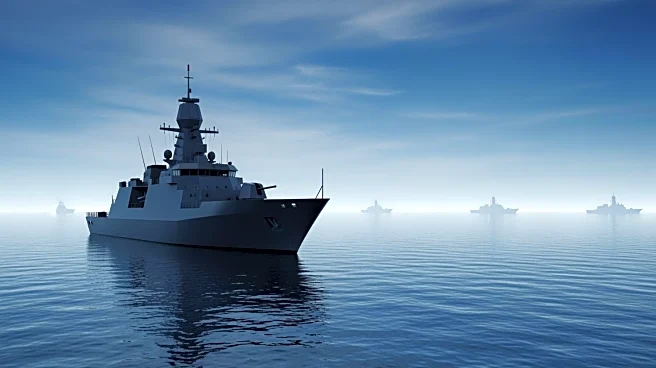What's Happening?
The European Union's diplomatic arm, the EEAS, is advocating for a maritime declaration that would empower EU nations to collaborate with flag states to conduct inspections on Russia's 'shadow fleet' of
oil tankers. This initiative is part of the EU's broader strategy to curb Russian oil and gas revenues, which are believed to be financing the ongoing conflict in Ukraine. The proposal comes as EU foreign ministers prepare to meet to discuss new measures against Russia. The Group of Seven industrialized economies has also agreed to target countries aiding Moscow in circumventing sanctions and those increasing Russian oil imports. The EEAS document highlights the need for bilateral agreements between flag states and the EU for pre-authorized boardings for inspections, addressing the issue of fake flag registrations. Estimates suggest the shadow fleet comprises between 600 and 1,400 vessels, with over 400 ships already sanctioned by Brussels.
Why It's Important?
The EU's proposal to inspect Russia's shadow fleet is significant as it aims to tighten enforcement of sanctions against Russia, potentially impacting its ability to fund military operations in Ukraine. By targeting the shadow fleet, the EU seeks to disrupt the flow of oil revenues to Moscow, which could have broader implications for global oil markets and geopolitical dynamics. The move also underscores the EU's commitment to maintaining pressure on Russia and supporting Ukraine amidst the ongoing conflict. The potential increase in sanctioned vessels and the ban on Russian LNG imports could further strain Russia's economy and alter trade patterns, affecting stakeholders in the energy sector.
What's Next?
The EU is expected to adopt its 19th package of sanctions soon, which will likely increase the number of sanctioned vessels and advance the ban on Russian LNG imports to January 1, 2027. The proposal may lead to heightened diplomatic discussions among EU member states and flag states to finalize agreements for inspections. The effectiveness of these measures will depend on the cooperation of international partners and the ability to enforce sanctions robustly. The EU's actions may prompt responses from Russia and other countries involved in the shadow fleet, potentially leading to shifts in alliances and trade relations.
Beyond the Headlines
The EU's focus on the shadow fleet highlights the complexities of enforcing international sanctions and the challenges of regulating maritime activities. The issue of fake flag registrations raises questions about the integrity of global shipping practices and the need for enhanced transparency and accountability. The proposal also reflects broader concerns about the environmental impact of maritime operations and the role of international cooperation in addressing these challenges. As the EU navigates these issues, the balance between economic interests and geopolitical strategies will be crucial in shaping future policies.










